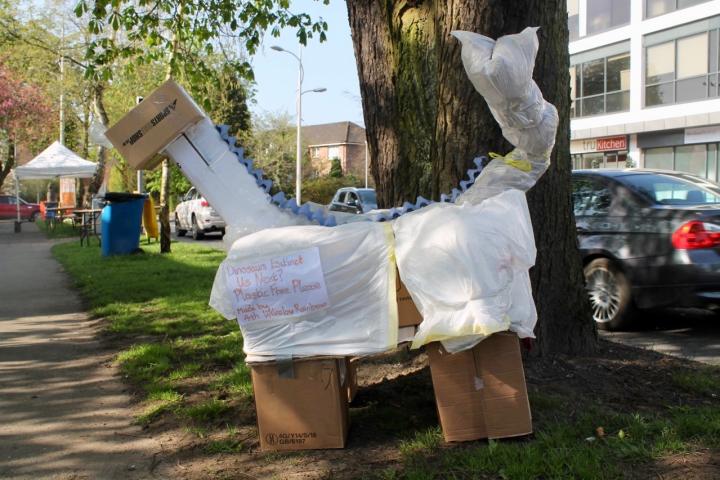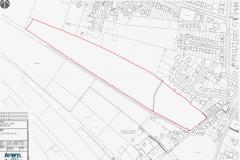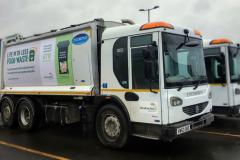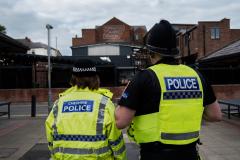
The Steering Group behind the drive to attain 'Plastic Free' status for Wilmslow has been working steadily to raise the profile of the movement both with businesses and with residents.
On Thursday, 1st November, the Group will host a second public meeting on plastic free progress. This will be a forum both for members of the public to hear about those operations in Wilmslow that have actively taken steps to reduce their use of single trip plastics, and for ideas of actions which individuals can take in order to achieve the status of 'Plastic Free Town' for Wilmslow.
The meeting will be at the United Reformed Church on Alderley Road at 7.30pm on November 1st when everyone is welcome to go along listen and ask questions to help cut plastic use.
Ruth McNulty, Chair of the Steering Group, said "There is a widespread concern among residents of the town that reducing our consumption of plastics is to be encouraged. Equally there are a number of businesses, which are aware not only of this attitude but who are keen to remove plastic from their operation. Last month we audited businesses and their use of plastic and paper straws and will be undertaking further surveys in the months to come"
"Reduce, reuse and recycle will remain the principles of future action. Come to the meeting and hear from the Clean Team, from ANSA and their drive to recycle plastic, the Town Council, and from people who have already reduced or replaced plastic in their individual households."
Photo: "Dinosaurs extinct - us next?" Built by 4th Wilmslow Rainbows.









Comments
Here's what readers have had to say so far. Why not add your thoughts below.
The NHS is acutely aware of its use of plastics and is working diligently to evaluate the benefits of those items that are vital and those that are discretionary. The doctors, who are working with us, may like to comment in a more informed way.
Plastics are an inbuilt part of our daily lives and we cannot eradicate their use entirely. However, each of us has the ability to evaluate our own personal use of plastics and to judge whether it is possible to use alternatives.
Interestingly, we have been told that Wilmslow customers are sensitive about the use of unnecessary single use plastic items and that this has significantly helped some town centre operations to review and remove single use plastics where possible as this is a positive marketing effort to attract business.
You may have read that the Government is about to ban the use of plastic straws and other single use plastic items. We hope that this will help drive the industry to substitute alternative materials,
Individually we can only make a trivial change. Collectively - and with a positive attitude - we can assist in substantial drive towards the objective. Let's stay positive!
Many firms for example, are working hard to reduce their useage of plastic, for example takeaway food, snacks and coffee mugs.
The more we can all do to reduce polluting our land, sea and air the better the world will be for current and future generations.
Add this to global warming and it’s painfully obvious that we have a serious problem.
I’m positive Ruth and so are all of the family!!
In our recent survey about the use of plastic straws it was very evident that the independent outlets appeared more sensitive to this issue - and have certainly been more proactive than the national chains. Indeed one - Rise - said that their Wilmslow customers were more alive to the negative impacts of one trip plastics and have all but eradicated their use.
The butcher and the fishmonger on Chapel Lane are both happy to serve your purchase in your own container rather than wrap in a plastic coated paper or bag
But we, as customers, could refuse one trip plastics that could help keep this issue in front of the staff in all outlets, including those who do not currently appear to be sympathetic.
We are currently initiating discussions with schools to encourage action that could address reduced use of plastics.
We would like to learn of helpful initiatives adopted by households or businesses that we can share with others
What do black plastic trays, styrofoam takeaway boxes and PVC clingfilm have in common?
They're all "problem plastics" - non-recyclable, too expensive to recycle or toxic to the environment.
These materials aren't the only plastics that can cause problems for the environment - but they're some of the worst offenders. And whilst they're difficult to process, they're also easy to replace, with many alternative materials already out there.
One of our targets is the use of expanded polystyrene as a container for hot take-away foods that is not only an unrecyclable material but is also one of the significant contributors to litter contamination in Wilmslow. Members of the Clean Team may like to comment.
I suspect that this is firmly in the hands of consumers. If we refuse to have our fish and chips wrapped in polystyrene but simply in paper that could help. Alternatively take our own container.
The High school is joining our campaign to explore ways in which they can help drive the reduced use. Their caterers were tasked some months ago to explore reductions in their supply of foods without use of plastic wrappings. Students are now welcoming additional guidance hopefully including their own behaviour.
The conversations we are initiating around the town all indicate that we are pushing at an open door and there are many households other than the Roeves who are examining their own use of single use plastics and the ways in which they could be reduced. The internet offers a whole host of interesting ideas to move away from everyday plastic items.
Real change will only come when supermarkets start doing something other than paying lip service to the issue.
If I go into Sainsbury’s in Wilmslow to buy four apples and see that they’re wrapped in plastic, how far must I walk to find an outlet able to sell me four apples not wrapped in plastic?
And I deliberately ask how far I must walk because as soon as I jump into a car I negate any benefit that I might have made.
In a relatively affluent area like Wilmslow perhaps there’s now a market for a conscience-driven, independent grocery business that sources and sells products in a way that’s sympathetic to the environment.
But back to supermarkets (what’s “super” about them?) An easy start would be to raise the charge for (plastic) carrier bags to £5 each. If you’re in a hurry and you stop off to do some shopping without having re-useable bags with you, the current 5p or 10p charge isn’t enough to force you to think harder or change your habits.
Isn't the appropriate course to do that to which each one of us can achieve?
As a pressure group we are trying to address the issue as you would expect and involving households, businesses and using what influence we have in other quarters. One of our first actions was to engage the Town Council, who are fully committed to the project
The 5p levy on 'free' plastic bags has actually had a significant impact on consumer behaviour - reducing consumption by 80% - and generating funds for local environmental improvements. I speculate that few of us now travel either on foot or in our cars without a bag to hand to carry impromptu purchases. This levy will shortly apply to all businesses.
I strongly urge Alan Brough to join with other voluntary groups to help promote a more positive 'can do' approach to a wide spread of issues in Wilmslow.
In order to make any difference this has to be led by Government and Big Business. The rot is too far established for a few right-thinking, middle class eco-warriors to make ANY appreciable difference.
I’m sorry but supermarkets themselves acknowledge that the 5p bag charge has made little difference. I would challenge you to show me any stats that show an 80% improvement... that WOULD be a real and exiting game-changer.
Sadly, the fact is that the introduction of the charge for plastic bags reduced the use of plastic bags by 17 per cent in the first year but in subsequent years there has been a small year-on-year increase in their use. So yes, we are better than where we were, but not really making any difference to the bigger problem.
I work closely with the Enviro - Recycling industries and can say that plastic waste is traded across domestic and international platforms and unless Governments and Big Businesses get properly engaged, we are being made fools of.
Their figures, based on the reported plastic bag usage of the 7 principal retailers in the UK(Tesco, Sainsbury, M&S, Morrisons, Waitrose, Asda and the Co-operative group) fell by 83% in the first full year after the 5p levy was introduced. If the numbers are spread among households, this was equivalent to an annual usage of bags of 140 before the levy and 25 afterwards.
I wonder precisely which supermarkets have indicated that the levy has made 'little difference'. Perhaps Mr Brough, with his inside knowledge of the industry, could enlighten us?
But the figures (mine and yours) serve to demonstrate the point I was attempting to make at the outset.....that meaningful change will only come when Governments and big businesses lead that change.
I suspect you have made the assumption that our steering group is focussing its energy on altering consumer behaviour. Far from it - our activities have principally centred on businesses in the town although - as the Artisan Market stall demonstrates - we are keeping the issue in front of a sympathetic audience.
I would still be interested to learn which supermarket or supermarkets has or have said that the 5p bag charge has made little difference.
Pleased to clarify - in this matter at least I believe we are on the same side, albeit I would like to see more done by those that can make the biggest and quickest differences.
Marcus Gover is CEO of a Govt. Environmental Charity called “Wrap.” In an article in The Grocer magazine he said that leading supermarkets acknowledge that their progress in reducing single use plastic is disappointing and that they need to do much more work with supply chain and packaging in order to meet the Courtauld 2025 targets. Current estimates suggest a 17% reduction though some analysts suggest that the figure is exaggerated.
I don’t believe that this is surprising as I see much more packaging of supermarket fruit and veg and an increase in things like plastic packaged salads, lunch pots , sandwiches and many other products.
Those defending the use of plastic say that it offers much greater longevity to food life - plastic wrapped cucumber (for example) will last up to three times longer than unwrapped.
In my working life I see an increase in the movement of plastic waste being traded - either for incineration or recycling.
However, we all must review the problems of plastic use posed by cost and convenience weighed against current and long term damage in whatever ways we are able.
My discussions with industry users and commercial businesses encourages those of like minds to continue to press for changes.
I am of the view that we're not tilting at windmills but rather pushing at an open door.
1. recycling
2. incineration
3. landfill
Types of plastic and % sent for each option?
We all need to support the aims of organisations like Less Plastic and Surfers Against Sewage, good luck with the Plastic Free accreditation for Wilmslow.
It seems I'm not alone in feeling disappointed that the plastic cup (2.5 billion thrown away each year!) issue was not tackled this week, Friends of the Earth, Greenpeace etc were hoping for better.
https://ind.pn/2Rn2Azc
If you have any time to spare, read the Executive Summary of the UN Roadmap for Sustainability, it's very clear about what must be done. The rest of the report makes very sobering reading... but it's better than watching "Strictly"!
https://bit.ly/2LtehRN